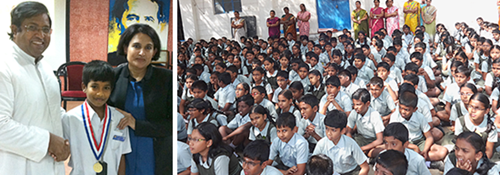MUMBAI, INDIA—Like the United States, India is a huge country with vast geographical and cultural variation. But because Math is a universal language—the language of numbers—the First In Math program is a great way to make math accessible to students across different geographies and cultures in both countries.
Monica Patel, First In Math Online Program Implementation Specialist and CEO of First In Math India, travels from her home in the United States to visit schools in her home country of India several times each year. “Aside from a few differences in terminology—in the U.S. we say MATH and in India it is MATHS—there are many more similarities than differences,” explains Patel.

Left: Rev. Father Irudayaraj, Principal at Don Bosco School in Chennai, and Monica Patel pose with the #1 FIM player in India, Joel (6th standard). Right: A school assembly in Coimbatore attended by Patel.
Indian schools are charged with educating very diverse populations—just like in the U.S. There are students studying in government-aided schools as well as premier residential academies. The First In Math program shines in either environment, according to Ms. Sangita Chima, Headmistress of the Lawrence School. “Among all categories of schools the outpouring of love for First In Math and the lifelong love for learning maths it has created helps propel students toward success.”
In addition to connectivity issues in rural areas, most Indian schools are K-12 and have a large student body, so computer lab access is reserved for learning computer science and programming. To solve this problem, most schools mandate that FIM is done entirely at home—except in the case of residential academies, where the program can be used on campus.
Taking into account each school’s issues, Patel and her team share FIM Best Practices that work across the board in elementary schools across the U.S when applied faithfully. “Whether the program is used at home or in class, the number one factor contributing to success is using ‘Player of the Day’ to recognize every team’s top student EVERY DAY,” explains Patel. Next is giving out milestone awards during weekly assemblies, to “take the focus away from the classroom and make it school pride. Children thrive on challenges and recognition—regardless of what part of the world they come from.”
“My most cherished memories are from the culturally-rich school assemblies that I attend,” says Patel, explaining that daily or weekly gatherings of the entire student body are the norm in India. Typically, students are recognized for achievements in various curricular and extra-curricular activities, such as First In Math.
Each assembly ends with the principal’s message, which is a call to action that focuses on the student’s role as a citizen. “This to me is the pure truth of what schooling should be about,” offers Patel. “As I heard one Principal say: School is the birthplace of the citizen.”